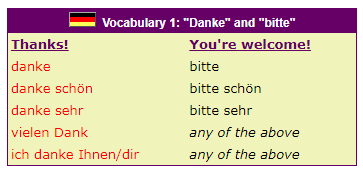The use of "bitte"
As the dialogues in this section have shown, the German word bitte and its variants bitte schön and bitte sehr can have a variety of meanings.
When you are asking somebody for something, you would use "bitte" to translate "please" - i.e. "eine Currywurst, bitte" (= "a curried sausage please").
"Bitte" is used by a waiter or someone offering a service to attract the customer's attention. We might translate it by "Can I help you?".
You would also say "bitte" when handing things over to somebody. In this context it would mean "Here you are". You would expect the person to whom you were handing over the object to respond by saying "danke" (see below).
"Bitte" is also used as a response to "danke", which is the German equivalent of "thanks" or "thank you". "Bitte" then means "You're welcome!" or "Don't mention it!". This acknowledgement of thanks is not simply a matter of politeness - it can be impolite not to follow a "danke" with a "bitte", since to a German speaker you may appear to be refusing their thanks.
"Danke" is often followed by either "schön" or "sehr". If so, then the "bitte" response will be similarly modified. The following table lists the pattern of responses:

 英语
英语 日语
日语 韩语
韩语 法语
法语 西班牙语
西班牙语 意大利语
意大利语 阿拉伯语
阿拉伯语 葡萄牙语
葡萄牙语 越南语
越南语 俄语
俄语 芬兰语
芬兰语 泰语
泰语 丹麦语
丹麦语 对外汉语
对外汉语

